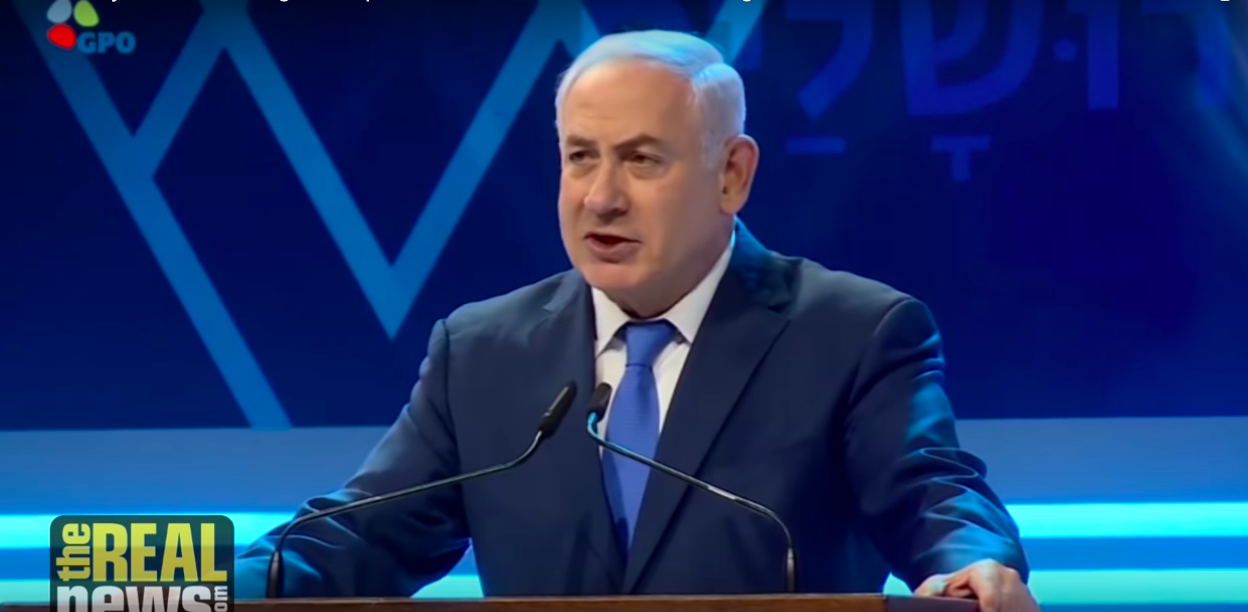Israeli Prime Minister Benjamin Netanyahu, whom Israeli police recently recommended be tried for bribery and fraud, faces yet another claim of corruption.
Phyllis Bennis, of the Institute for Policy Studies, recently appeared on The Real News to discuss Netanyahu’s most recent scandal, and the implications it could have on the instability of the Middle East.
After reading a police report alleging he committed bribery and fraud, Netanyahu said it was “biased, extreme, [and] full of holes like Swiss cheese.”
The most recent case brought against him, though, has one less hole than the previous three: Shlomo Filber. Filber, who was one of Netanyahu’s closest and longest serving aides, is now serving as the government’s witness in a case bringing allegations of a quid pro quo between Netanyahu and Bezeq, an Israeli telecommunications company.
“There are four separate cases [against Netanyahu] underway that have to do with bribery, fraud, and breach of trust,” said Bennis.
Bennis likened Netanyahu’s response to the allegations to the Trump administration’s response to the Russia investigation. “There are claims,” explained Bennis, “that Netanyahu sent private investigators to investigate the police that were investigating him… very much as we’re seeing here [in the U.S.] with Trump attacking the FBI, who is investigating him.”
Bennis worried that the swirl of allegations around the Israeli Prime Minister could lead him to act aggressively in the broader region. “I do think that the overview is more important in terms of how this really threatens the Palestinians, it threatens the region, [and] it threatens Iran,” she said.
“We’ve already seen an escalation in the last week or so when there was an apparently unarmed drone found in Israeli airspace. It was shot down,” said Bennis. “Israelis responded with a number of F-16 bomber strikes into Syria, attacking both Syrian and Iranian targets.”
Meanwhile, reports are spreading of Israel’s growing role in Syria, where Israel has supported extremist groups during the country’s civil war.
Bennis suggested that Iran and Israel are “clearly not interested in further escalation.” Though that is the case now, “how long that will remain the case, we don’t know,” she said.
Netanyahu refers to those tensions as, “one positive consequence of Iran’s growing aggression in the region,” which he claims has “brought Arabs and Israelis closer together” than ever before.
“He’s referring to the fact that there is in fact a far more public level of alliance right now between Israel and the Gulf Arab states,” Bennis said.
She added that the budding alliance has the “Trump administration’s involvement all over it.”
Bennis warned that U.S. support for Israel and its new Arab allies could lead them to instigate a dangerous new conflict with Iran. “It’s a very dangerous moment because if [the Israelis and Saudis] start to feel too cocky…to feel that the U.S. will back an Israeli-Saudi initiative against Iran regardless of how reckless it might be, it could become almost as dangerous as the threat of war in North Korea,” she concluded.
